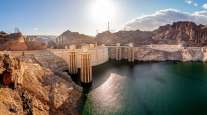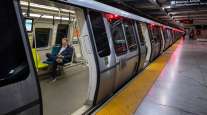Senior Reporter
Congressional Problem Solvers Caucus Unveils Infrastructure Plan

[Stay on top of transportation news: Get TTNews in your inbox.]
A bipartisan group of lawmakers pursuing compromise with congressional leaders unveiled an infrastructure policy proposal backed partly by an increase in the fuel tax.
The 58-member bipartisan Problem Solvers Caucus’ proposal seeks to improve “highways, roads and bridges, transit and railways, ports and airports, water and sewer systems, energy systems and the power grid, and broadband and communications networks” to achieve infrastructure resilience and greater access to freight and passenger corridors, it said.
The group’s blueprint is meant as an alternative to the White House’s $2.25 trillion plan and the Senate GOP’s nearly $600 billion option. On April 23, Rep. Josh Gottheimer (D-N.J.), the group’s co-chairman, said, “The survival of our country depends on bipartisan solutions, and bipartisan governing.”
Today, the Problem Solvers are releasing a new report of bipartisan policy recommendations to build a strong, successful 21st Century infrastructure network for America.
Read the report here: https://t.co/UKewrCTqBA pic.twitter.com/RIi985hKXI — Problem Solvers Caucus (@ProbSolveCaucus) April 23, 2021
With an emphasis on surface transportation modes, the caucus is calling for preserving and expanding tax-advantaged infrastructure financing options, incentivizing the adoption of public-private partnerships, and enhancing transparency in the federal grants process.
Additionally, the group proposes designating a rural liaison at certain federal agencies, reforming an infrastructure loans program, streamlining the permitting process, and investing in severe-weather resilience programs.
“America’s vast network of surface transportation infrastructure has given our country a major economic, competitive advantage in a global economy,” the proposal stated. “Unfortunately, Congress has allowed a vast backlog of deferred maintenance to grow in our existing infrastructure while failing to keep up with increasing demand. This has made it harder for businesses to compete, caused workers and families to spend more time stuck in traffic each day, and left much of our infrastructure crumbling and unsafe.”
2021 PSC Infrastructure Rep... by Transport Topics
To back aspects of its plan, the group suggests adjusting the federal fuel tax, which was set at 18.4 cents-per-gallon for gasoline and 24.4 cents-per-gallon for diesel in 1993. The fuel tax could be adjusted annually for inflation via the Consumer Price Index, the National Highway Construction Cost Index or the Corporate Average Fuel Economy, or CAFE, standards, according to the proposal.
The group also points to the potential for transitioning to a vehicle miles traveled, or VMT, fee program, enhancing an annual registration fee on fully electric and hybrid electric vehicles, and adopting a fee based on the value of certain freight to broaden an air cargo tax to trucking operations.
“It is vitally important that we build a bridge and put together bipartisan legislation that is both responsive to local needs and worthy of the public’s trust,” said Rep. Brian Fitzpatrick (R-Pa.), a caucus member. “Infrastructure investment can and will deliver real benefits to every American and additionally, has the unique power to unite us as a nation.”

Manchin
With transportation committees readying consideration of highway policy legislation, the bipartisan caucus noted their interest in negotiating with congressional leaders. Already, key policymakers have endorsed their plan. Sen. Joe Manchin (D-W.Va.), a member of the Appropriations Committee, sounded hopeful about working with the White House and senior Republicans on infrastructure policy.
“There’s not a greater common cause than infrastructure,” Manchin said April 23 alongside members of the caucus and the governors of Maryland and Virginia. “If we can’t come together on infrastructure in the most toxic atmosphere we’ve had in Washington, then we’re in trouble. Infrastructure is what makes this country great. It’s what’s grown this country. It’s where all the opportunities are; it’s where the jobs come from. And we all have the needs. And we all have the ability to fix this. And we’re looking together to find the solutions.”
The senator went on, “We really truly believe that we should do a conventional infrastructure bill that can be done bipartisan.”
Want more news? Listen to today's daily briefing below or go here for more info:




